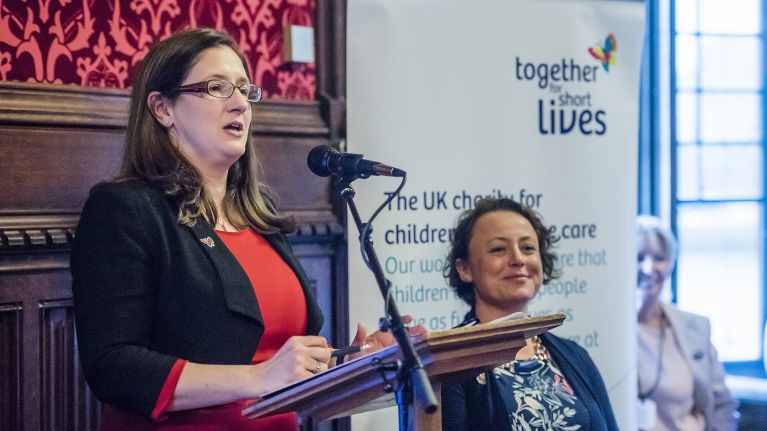
Consistent, high-quality children’s palliative care can help families make the most of every precious moment together. But if parents can’t access vital services, everything can seem like a battle. Every day, they face uncertainty, overwhelming responsibility, and disruption to family life. That’s why, on their behalf, we campaign and work with local MPs and the Government for consistency, better funding and easy access to local services. One of the ways we do this is via an APPG.
What is the APPG?
All-Party Parliamentary Groups – or APPGs – are informal cross-party groups that have no official status within Parliament. They are run by and for Members of the Commons (MPs) and Lords, though many choose to involve individuals and organisations from outside Parliament in their administration and activities.*
APPGs vary enormously in size and scope. Some focus on specific issues and bring together support across parties to drive change on that issue.
Where does Together for Short Lives fit into APPGs?
Charities often play a vital role in APPGs to ensure the cause they are fighting for and the beneficiaries they work to help are represented within Parliament.
Together for Short Lives acts as the Secretariat for the specific APPG for Children Who Need Palliative Care. We take on this role to ensure that the voices of seriously ill children and their families are heard, and that the challenges they face are raised with MPs and peers who share an interest in improving children’s palliative care.
As a group, we come together to educate, inform, and motivate MPs to take action. By doing so, we hope to raise awareness of the key issues being faced and secure parliamentary support for the actions that we call on the Government to take.
How often does the APPG meet?
The APPG for Children Who Need Palliative Care meets two to three times a year to discuss significant policy developments and share findings from new research on issues confronting the sector. Topics can vary from meeting to meeting, but have included challenges such as access to 24/7 end of life care at home and the sustainability of statutory funding for children’s hospices.
These meetings are also valuable opportunities to bring the wider sector together to advocate for change. In addition to MPs and peers, recent events have seen representatives from children’s hospices, voluntary sector providers, NHS professionals, research institutes and groups, and people with lived experience all attend.
By bringing all these voices together in the same room, the APPG helps build a shared understanding of the problems families face and what needs to change.

What happens at the APPG meetings?
An APPG meeting can take many different forms, though the most common are roundtable meetings, drop-in events and receptions.
Receptions typically last for two hours. There is usually an opportunity for attendees to network with MPs and peers at the beginning before hearing speeches from those with lived experience, sector representatives, Together for Short Lives and a government representative. Throughout the event, briefings are provided to MPs and peers summarising key findings from new research and setting out how they can help.
Drop-in meetings are longer in format, usually from 10am-4pm. The first few hours allow invited MPs and peers to come and go as they please. During this time, they will speak to Together for Short Lives’ staff and be given briefing documents setting out the key calls.
There is then an hour-long roundtable meeting in the middle of the day, chaired by the co-chairs of the APPG. Key speakers, including staff at Together for Short Lives, other sector representatives, and those with lived experience, will speak, and the Government will be given an opportunity to respond.
During the day, we will often have actions that MPs and peers can take then and there, such as signing a joint letter to a relevant government minister that we then send straight away after the meeting.
Do we involve parents of seriously ill children in the APPG meetings?
Yes! At all APPG events, we aim to ensure that a person with lived experience is present to speak about their experience of accessing children’s palliative care. For us, it is important that they have a voice in this forum and be able to speak their truth to those in power. We are also fortunate to work with some exceptional young people, who have also attended our meetings in the past to speak up for seriously ill children and their families.
What happens after the APPG meeting?
We capture the conversations that took place at the meeting and follow up with MPs and peers that attended afterwards, to make sure any agreed-upon actions are carried out. We are there to support the MPs and peers to take these actions to Parliament, offering guidance they may need to do so.
Who can attend the APPG?
All MPs and members of the House of Lords are welcome to attend an APPG for Children Who Need Palliative Care meeting or event. In fact, the APPG is a key forum for parliamentarians who are interested in supporting the sector or simply want to learn more about children’s palliative care.
Sometimes MPs attend because a constituent has written to them, perhaps as part of a Together for Short Lives campaign, asking them to come and find out how they can help.
How can I get my local MP to help?
You can have a big impact by inviting your MP to attend an upcoming APPG. To find out when the next meeting is and how you can invite your local MP to attend and take action for seriously ill children and their families, keep an eye on our social channels and website.
We will promote easy ways you can write to our local MP – by joining in our campaigning efforts, you are helping us in our aim to ensure seriously ill children and their families can access the care they need when and where they need it.
